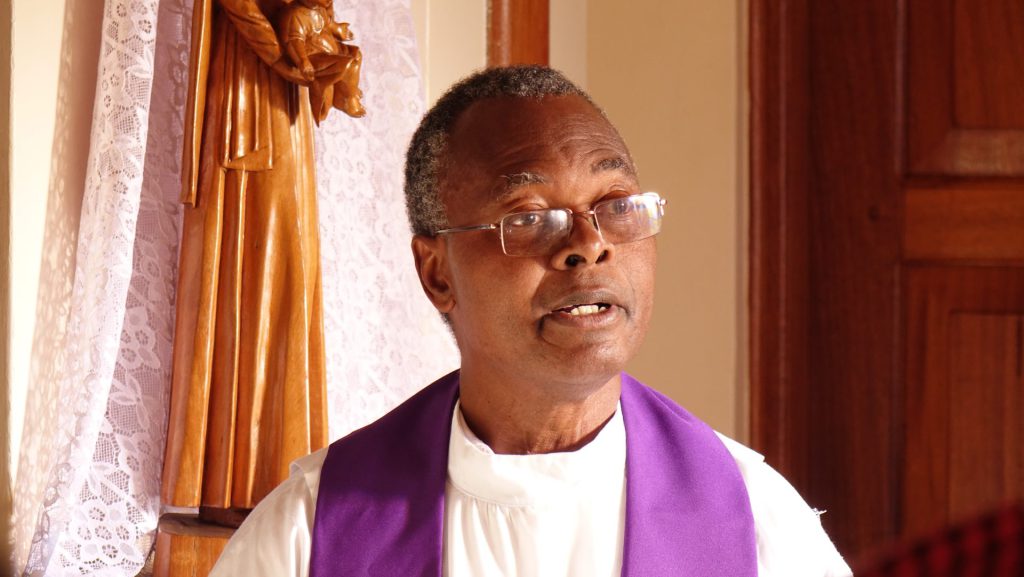God has never deserted the vicissitudes of human life
Gospel: Mark 16:1-7

The Holy Saturday Reflection is by
Fr. Eugène Goussikindey, SJ.,
Director, Centre de Recherche,
d’Étude et de Créativité (CREC), Benin
Holy Saturday is a day like no other. Yet it represents a special day in my Christian experience. If you look closely, the liturgy does not provide for anything specific apart from . Now, the vigil is an anticipation of Easter Sunday. Choosing a text for meditation becomes difficult when you want to live this Holy Saturday to the fullest. What comes to mind this year are two moments that frame this day of Holy Saturday well and can serve as a composition of places for those familiar with the Ignatian tradition. The first moment corresponds to the last words of the Word on the cross on Good Friday: “It is finished”. The Evangelist continues: “Then he bowed his head and gave up his spirit” (Jn 19:30). The second moment is the word from the tomb: “Are you looking for Jesus of Nazareth, the Crucified One? He is risen: he is not here.” Between these two words, there is nothing but the dead silence that invades us when we begin Holy Saturday.
The Word who was in the “beginning”, whose word is the origin of all creation and who was “life” (Jn 1:1-4), enters into total silence, a silence of death, when he surrenders the spirit. The Word made flesh “was buried” as affirmed by the tradition received by St. Paul (1 Cor 15:4) that we profess every time we recite the Creed. The tomb is transformed into the very symbol of Holy Saturday. Perceived as man’s final resting place on earth or as the visible sign of finitude, the true distinguishing feature of the tomb is silence. The experience of Holy Saturday is, for me, one of silence that falls on the strong emotion of Good Friday, when the suffering and death of a righteous, an innocent person who spent his time doing good has shaken our conscience. The drama of Good Friday could not have had a better response on Holy Saturday than a silent meditation, without words, because the Word, the eternal Word, is silent. Scripture is in abeyance.
It is this gloomy veil that has been imposed on Holy Saturday since the last words of the Word on the cross: “It is finished”. It took the courage and determination of a few women: Mary Magdalene, Mary mother of James and Salome, to make their way to the tomb where the Crucified One was laid. But, instead of a last homage to the Crucified One, they hear a voice from beyond the grave, carrying a message, a good news: “Are you looking for Jesus of Nazareth, the Crucified One? He is risen, but he is not here” (Mk 16:6). Holy Saturday ends with a word that reveals the other side of the veil of death: he is not here, that is to say, death has not held him back! “He goes before you into Galilee.” So the mourning, the ordeal of the grave, is over. Holy Saturday ends with a mission: “Now go and tell your disciples and Peter” that it is in Galilee, where everything began, that they must begin again.
When I think about it, the audacity to get up “early in the morning” and take the road to the grave is not mere temerity, it is the strength of the liberated spirit when “all is accomplished”, it is the inner strength that refuses to yield to the silence inflicted by suffering and pain, injustice and oppression. Like Mary Magdalene, Mary mother of James and Salome, I must brave my tombs, those places where hope dies in my life, those places where suffering, failure, disappointment, the tribulations of my relationships, my fears and my doubts swarm and paralyze me. I must listen again to this voice that comes from beyond the grave, to say to me: “Are you looking for the Crucified One? He’s not here.” The crucified one is no longer in those places where death reigns, for life has triumphed. He precedes in Galilee!
Holy Saturday is ultimately a time for a new beginning. And, as if to prevent us from going astray, this departure is under the guidance of the Scriptures. The night of Holy Saturday plunges us straight into the stories that remind us that God has never deserted the vicissitudes of human life. In Jesus of Nazareth, “It is finished.” The sorrowful hearts of Good Friday find in the night of Holy Saturday the joy summed up in a single word: “He is risen”. With St. John, we can move from meditation to contemplation of this testimony: “In him was life, and life was the light of men; The light shines in the darkness, and the darkness has not stopped it. (Jn 1:4-5)


Comments are closed.